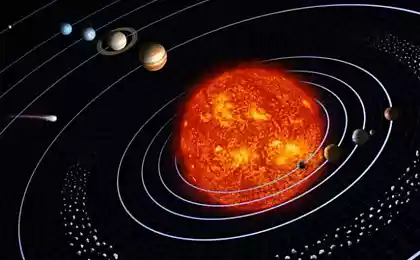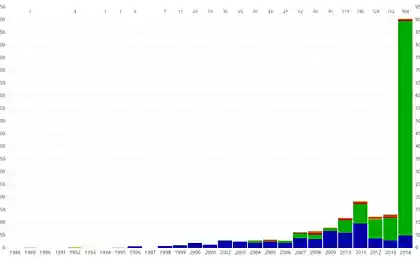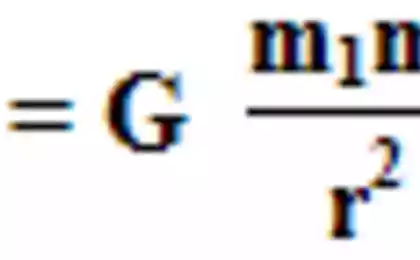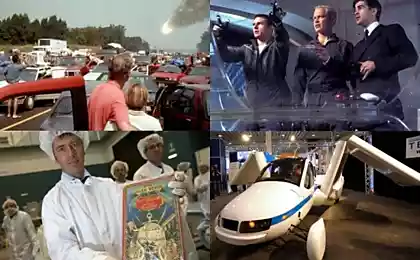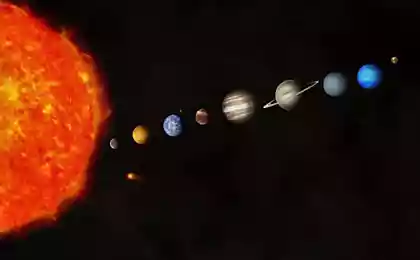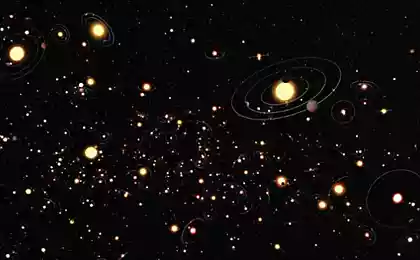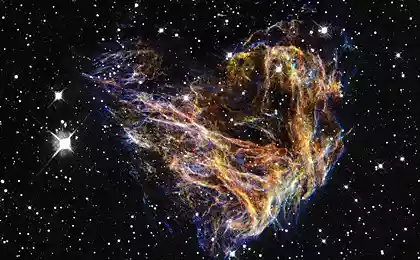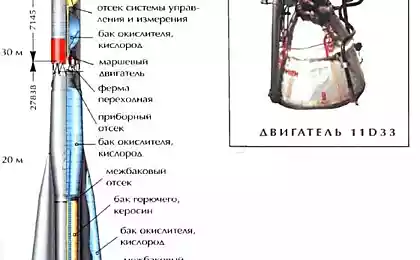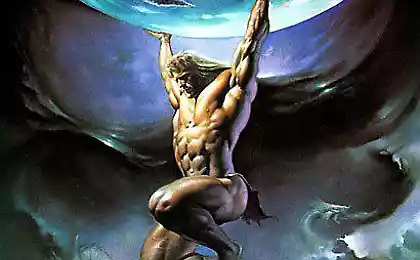1318
15 most read and iconic works of science fiction in the Western Hemisphere of our planet.
In the continuation of the 15 most widely read and iconic works of science fiction in the Western Hemisphere of our planet.
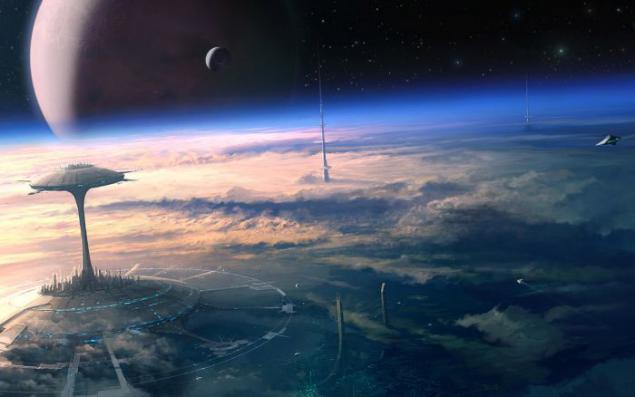
1.Mashina time
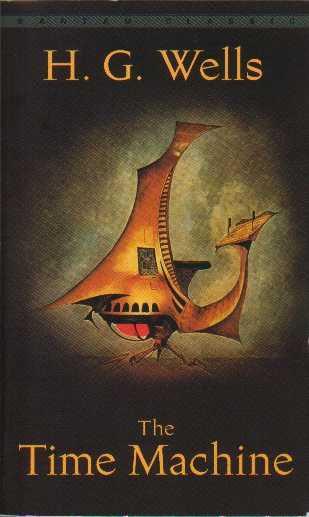
Author: HG Wells
HG Wells novel, his first major science fiction. Adapted from a story in 1888 "Argonauts of time" and published in 1895. "Time Machine" introduced the idea of fiction time travel and is used for this time machine, which used a variety of later writers and created hronofantastiki direction. Moreover, as noted by Yu Kagarlitskiy, both scientifically and in regard obschemirovozzrencheskom Wells "... in a sense, anticipated Einstein's" special theory of relativity formulated ten years after the release of the novel
The book describes the journey of the inventor of the time machine into the future. The plot - the adventures of the protagonist in the world, located in 800 thousand years, describing that the author started with the negative trends in the development of contemporary capitalist society that has allowed many critics called the book a novel-warning. In addition, the novel was first described many ideas related to time travel, which for a long time will not lose its attractiveness for readers and authors of new works.
2. Stranger in a Strange Land
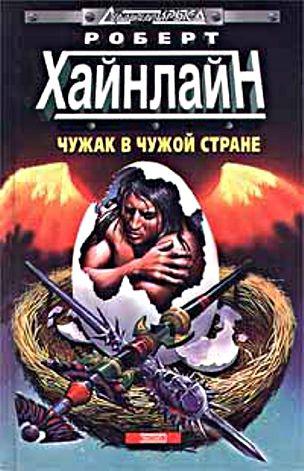
Author: Heinlein, Robert Anson
Fantastic philosophical novel by Robert A. Heinlein, in 1962, the award-winning "Hugo." The West has a "cult" status, regardless of the most famous science fiction novels ever written. One of the few works of fiction, the Library of Congress included in the list of books that shaped America.
The first expedition to Mars has disappeared without a trace. Third World War pushed the second, successful expedition to the long twenty-five years. New researchers have established contact with the native Martians and discovered that the first expedition was lost, not all. And the earth brought "Mowgli space age" - Michael Smith Vallentyne, educated local sentient beings. A man and a Martian origin for education, Michael bursts into a bright star in the usual routine of the Earth. Endowed with the knowledge and skills of the ancient civilization Smith becomes the messiah, the founder of a new religion and the first martyr for his faith ...
3. Saga Lensmenah
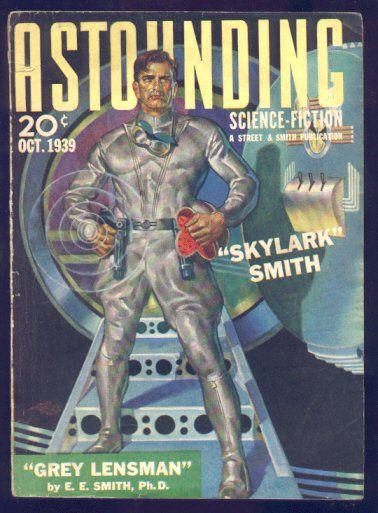
Author: Edward Elmer 'Doc' Smith
Saga Lensmanah - a history of confrontation millionoletnego two ancient and powerful races: the evil and cruel eddorian who are trying to create a huge empire in space, and the inhabitants of Arrizii, wise young patrons civilizations emerging in the galaxy. Over time, this fight will come, and the earth with its mighty space fleet and Galactic Patrol Lensmanov.
The novel was an instant unprecedentedly popular among fans of science fiction - it was one of the first major works whose authors dared to bring the action of the solar system, and since then, Smith, along with Edmond Hamilton considered the founder of the genre of "space opera».
4. 2001: A Space Odyssey
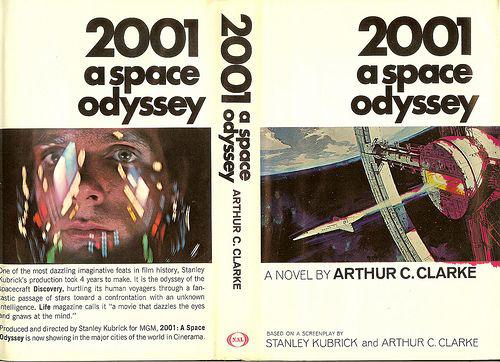
Author: Arthur C. Clarke
"2001: A Space Odyssey" - redesigned in a literary novel of the same name the film script (which, in turn, is based on an early story of Clark "All"), which became a classic fantasy genre and dedicated human contact with an extraterrestrial civilization.
The film "2001: A Space Odyssey" regularly include a list of "greatest films in cinema history." It and its sequel, "2010: Odyssey Two" received the Hugo Award in 1969 and 1985 as the best science fiction films.
The impact of the film and the book on contemporary culture is huge, as the number of their fans. And although 2001 has already begun, "Space Odyssey" is unlikely to be forgotten. It continues to be our future.
5. Fahrenheit 451
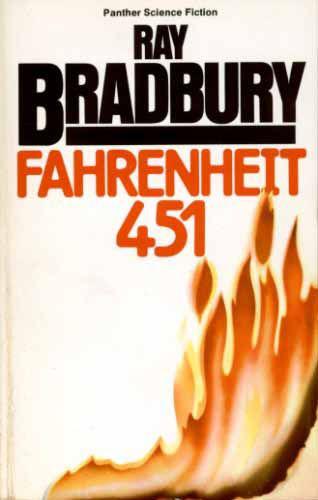
Author: Ray Bradbury
Roman dystopia famous American science fiction writer Ray Bradbury "Fahrenheit 451" has become, in a sense, an icon and the guiding star of the genre. It was created on a typewriter, which the writer took to hire a public library and was published for the first time are often the first issues of the magazine Playboy.
The epigraph of the novel says that the ignition temperature of paper - 451 ° F. The novel describes a society that is based on the popular culture and consumer thinking, in which all of the books, forcing to think about life, to be burned; storage of books is a crime; and people who can think critically, are outlawed. The protagonist of the novel, Guy Montag, is working "fire" (in the book involves the burning of books), being sure that gets the job done "for the benefit of mankind." But soon he was disappointed in the ideals of society, of which it is, it becomes an outcast and is attached to a small underground group of outcasts, whose supporters memorize texts of the books, in order to save them for posterity.
6. "Base" (other names - the Academy Foundation, Foundation, Foundation of)
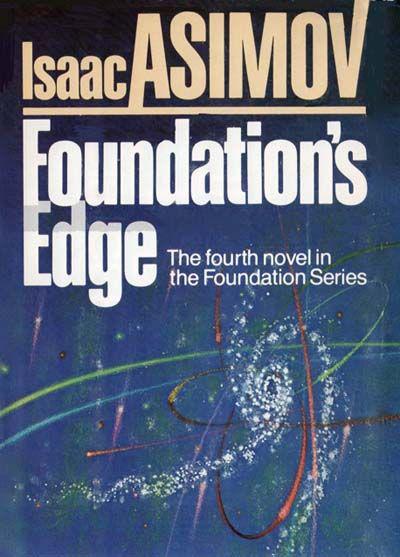
Author: Isaac Asimov
Classic science fiction, tells of the collapse of the great galactic empire and its revival through "Seldon Plan».
In later novels Asimov connected world Grounds with his other series of works about the Empire and positronic robots. Joint cycle, which is also called "Base", covers the history of mankind for over 20 000 years and includes 14 novels and dozens of short stories.
According to rumors, Asimov made a huge impression on Osama bin Laden and even influenced his decision to set up a terrorist organization "Al Qaeda". Bin Laden himself likened Gary Seldon, who manages the company through pre-planned future crises. Moreover, the title of the novel, translated into Arabic sounds like Al Qaida, and thus could give rise to the name of bin Laden's organization.
7. Slaughterhouse-Five (1969)
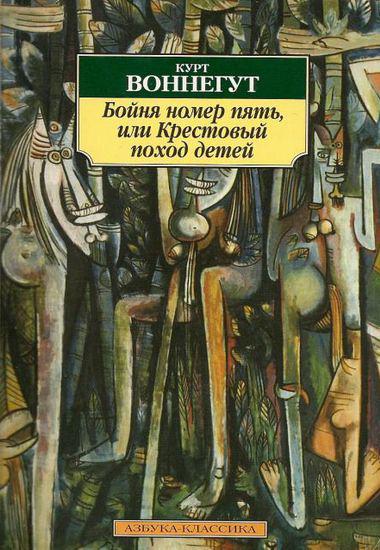
Author: Kurt Vonnegut
Autobiographical novel by Kurt Vonnegut about the bombing of Dresden during World War II.
The novel was dedicated to Mary O'Hare (and Dresden taxi driver Gerhard Muller) and written in "telegraphic-style schizophrenic," as he Vonnegut. In the book are closely intertwined realism, grotesque, fantasy, elements of madness, cruel satire and irony.
The main character - an American soldier Billy Pilgrim, an absurd, timid, apathetic people. The book describes his adventures in the war and the bombing of Dresden, which has left an indelible imprint on the mental state of Pilgrim, a child is not very stable. Vonnegut introduced the story of the fantastic element: life experiences of the protagonist are considered through the prism of post-traumatic stress disorder - a syndrome characteristic of the war veterans, who mutilated hero perception of reality. As a result, a comic "tale about aliens" grows into a certain harmonious philosophical system.
Aliens from the planet Tralfamadore take Billy Pilgrim to his planet and tell him that the time is not really "flow" is not a gradual random transition from one event to another - world and time once and for all are known to all that has happened and will happen . On someone's death trafalmadortsy simply say: "These things". We can not say why or why something happened - this was "the structure of the time».
8. The Hitchhiker's Guide to the Galaxy
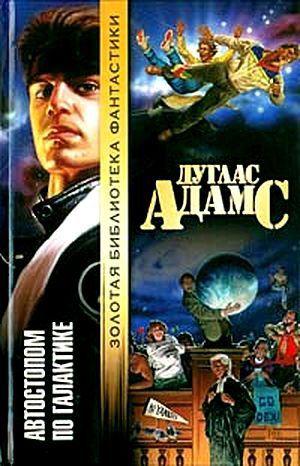
Author: Douglas Adams
Guide "The Hitchhiker's Guide to the Galaxy." Legendary ironic science fiction saga of Douglas Adams.
The novel tells of the adventures of the unlucky Englishman Arthur Dent, who with his friend Ford Prefect (a native of a small planet somewhere near Betelgeuse working in the edition of "Guide for hitchhikers") avoids the destruction of the destruction of the Earth race bureaucrats Vogon. Zaphod Beeblebrox, a relative of President Ford Galaxy, accident rescues Dent and Ford from death in outer space. On board the ship on stolen Zaphod nonprobabilistic drawn "Golden Heart" are also depressive robot Marvin, and Trillian, she Tricia McMillan that Arthur once met at a party. She soon realizes how Arthur, the only survivor of an earthling but himself. Heroes are looking for the legendary planet Magrateya and try to find the question, suitable for a definitive answer.
9. Dune (1965)
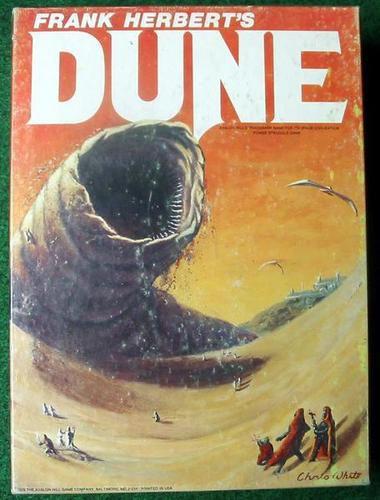
Author: Frank Herbert
The first novel of the saga of Frank Herbert's "Dune Chronicles" on the desert planet Arrakis. It was this book made him famous. "Dune" was awarded the Hugo and Nebula. "Dune" - one of the most famous science fiction novels of the XX century.
This book raises many political, environmental and other important issues. The writer was able to create a complete fantasy world and cross it with a philosophical novel. In this world, the most important ingredient - the spice that is needed for interstellar travel and on which depends the existence of civilization. This substance is only on one planet called Arrakis. Arrakis is a wilderness inhabited by huge sand worms. On this planet live Fremen tribes whose lives are basic and absolute value is water.
10. Neuromancer (1984)
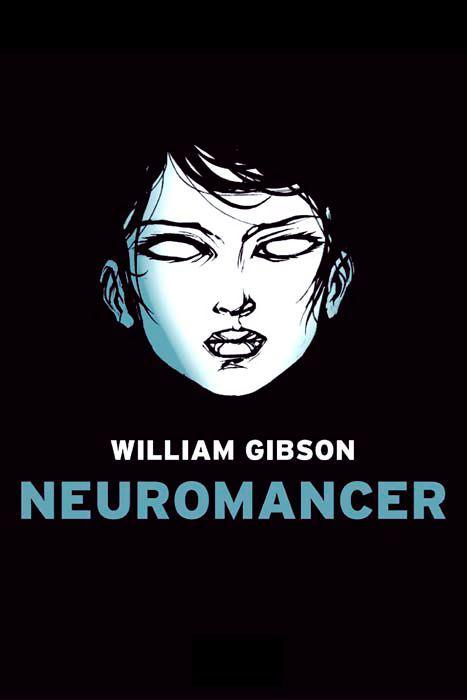
Author: William Gibson
The novel by William Gibson, a canonical work in the genre of "cyberpunk," award-winning "Nebula" (1984), "Hugo" (1985) and Prize Philip K. Dick. It is Gibson's first novel, which opens the trilogy "Cyberspace." Published in 1984.
This product examined concepts such as artificial intelligence, virtual reality, genetic engineering, multinational corporations, cyber (computer network matrix) long before these concepts became popular in popular culture.
11. Do Androids Dream of Electric Sheep? (1968)
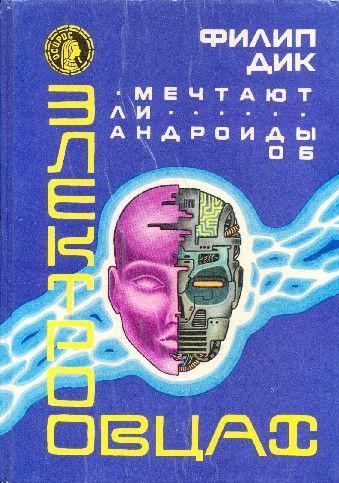
Author: Philip K. Dick
Science fiction novels of Philip K. Dick, written in 1968. He tells the story of "bounty hunter" Rick Deckard, who is haunted by androids - There is almost indistinguishable from a man outlawed on Earth. The action takes place in the radiation poisoning and partially abandoned San Francisco of the future.
Along with "The Man in the High Castle" this novel is the most famous product of Dick. This is one of the classic works of fiction, which explores the ethical issues of creating androids - artificial people.
In 1982, based on the novel by Ridley Scott directed the movie "Blade Runner" with Harrison Ford in the title role. The script, which was created by Hampton Fancher and David Peeples, quite different from the book.
12. The Gate (1977)
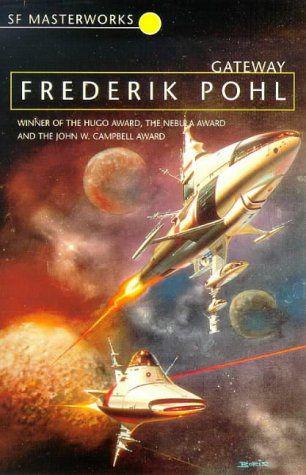
Author: Frederik Pohl
Science fiction novel by American writer Paul Frederick, published in 1977 and won all three major American award of the genre - "Nebula" (1977), "Hugo" (1978) and Locus (1978). The novel opens the cycle "Heechee».
Some people have found Venus artificial asteroid, built an alien race, called the Heechee. At the same asteroid discovered spaceships. People figured out how to operate the ships, but they could not change the destination. Many volunteers have experienced them. Some returned with openings through which becomes richer. But the majority returned with nothing. And some did not come back at all. Flying on the ship looked like a Russian Roulette - might get lucky, but it was possible to die.
The main character - a researcher who got lucky. His remorse - of the crew, who had the good fortune, returned it alone. And he tries to understand his life, confessing robot psychoanalyst.
13. Ender's Game (1985)
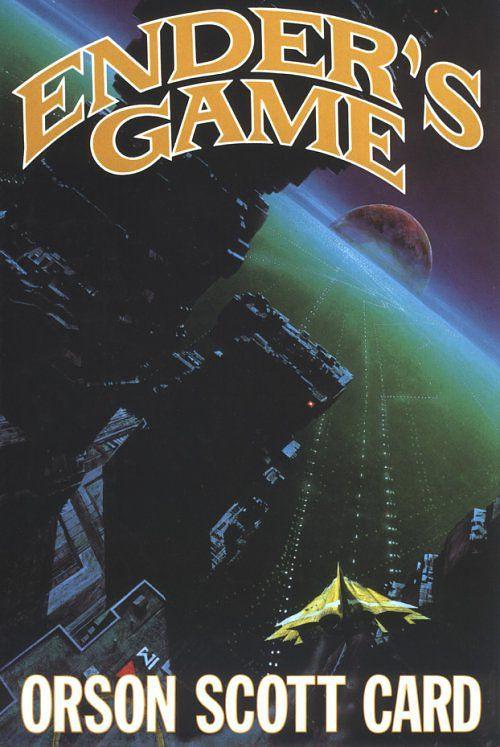
Author: Orson Scott Card
"Ender's Game" has received the award "Nebula" and "Hugo" for best novel in the 1985 and 1986 - one of the most prestigious literary awards in the field of science fiction.
The novel is set in 2135. Mankind has survived two invading alien race "zhukerov" (eng. Buggers), having escaped by a miracle, and is preparing for another invasion. To search for pilots and commanders, able to bring the world the victory, created a military school, which sent the most talented children from an early age. Among these children, and the title character of the book - Andrew (Ender) Wiggin, the future commander of the fleet of the Earth International and the only hope for the salvation of mankind.
14. 1984 (1949)
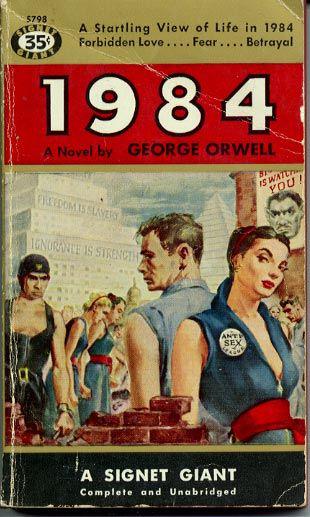
Author: George Orwell
In 2009, the newspaper The Times has included the novel "1984" in the list of 60 best books published in the last 60 years, Newsweek magazine put the novel into second place in the list of the hundred best books of all time.
The name of the novel, its terminology and even the name of the author later became a household and used to refer to social structure, similar to that described in "1984" totalitarian regime. Repeatedly became both a victim of censorship in the socialist countries, and the object of criticism from left-wing circles in the west.
Fantasy novel by George Orwell's "1984" tells the story of Winston Smith, who is engaged in rewriting history, on the basis of party interests during the reign of totalitarian junta. Mutiny Smith leads to terrible consequences. As predicted the author, nothing can be worse than a total lack of freedom ...
This work, which in our country was under embargo until 1991, called the dystopia of the twentieth century. (hatred, fear, hunger, and blood), warning about totalitarianism. Roman boycotted in the West due to the similarity of the ruler of the country's real Big Brother and the Heads of State.
15. Brave New World (1932)
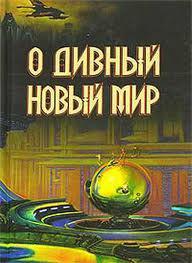
Author: Aldous Huxley
One of the most famous novels dystopia. A sort of the antithesis of "1984" Orwell. No torture dungeons - all happy and satisfied. On the pages of the novel describes the world of the distant future (the action takes place in London), in which people are raised in special factories embrionariumah in advance (the impact on the embryo at different stages of development) are divided into five different mental and physical abilities of castes that perform different jobs. From the "Alpha" - strong and beautiful knowledge workers to "epsilon" - polukretinov, which is available only to the most simple physical work. Depending on the caste babies are brought up differently. So, with the help of hypnopaedia, each caste piety brought to a higher caste and contempt for the lower castes. Costumes from each caste certain color. For example, go to a gray alpha, gamma - in green, the delta - in khaki, epsilon - in black.
In this society there is no place feeling, and it is considered rude not to have regular sex with different partners (the main slogan "everyone belongs to everyone else"), but the pregnancy is considered to be a terrible shame. People in this "world state" do not age, but the average life expectancy - 60 years. Regularly, to always have a good mood, they use the drug "soma", which has no negative actions ('soma grams - and no drama »). God is in this world is Henry Ford, his so-called - "The Lord is our Ford," and there is a chronology of the creation of the car "Ford T», that is, from 1908 BC. e. (in the novel, the action takes place in the year 632, "the era of stability", ie in 2540 BC. e.).
The writer shows the lives of people in this world. The main characters - people who can not fit into society - Bernard Marks (the upper classes, the alpha plyusovik), a friend of his successful dissenter Helmholtz and John Savage of the Indian reservation that lifelong dream to get into the wonderful world where everyone is happy.

1.Mashina time

Author: HG Wells
HG Wells novel, his first major science fiction. Adapted from a story in 1888 "Argonauts of time" and published in 1895. "Time Machine" introduced the idea of fiction time travel and is used for this time machine, which used a variety of later writers and created hronofantastiki direction. Moreover, as noted by Yu Kagarlitskiy, both scientifically and in regard obschemirovozzrencheskom Wells "... in a sense, anticipated Einstein's" special theory of relativity formulated ten years after the release of the novel
The book describes the journey of the inventor of the time machine into the future. The plot - the adventures of the protagonist in the world, located in 800 thousand years, describing that the author started with the negative trends in the development of contemporary capitalist society that has allowed many critics called the book a novel-warning. In addition, the novel was first described many ideas related to time travel, which for a long time will not lose its attractiveness for readers and authors of new works.
2. Stranger in a Strange Land

Author: Heinlein, Robert Anson
Fantastic philosophical novel by Robert A. Heinlein, in 1962, the award-winning "Hugo." The West has a "cult" status, regardless of the most famous science fiction novels ever written. One of the few works of fiction, the Library of Congress included in the list of books that shaped America.
The first expedition to Mars has disappeared without a trace. Third World War pushed the second, successful expedition to the long twenty-five years. New researchers have established contact with the native Martians and discovered that the first expedition was lost, not all. And the earth brought "Mowgli space age" - Michael Smith Vallentyne, educated local sentient beings. A man and a Martian origin for education, Michael bursts into a bright star in the usual routine of the Earth. Endowed with the knowledge and skills of the ancient civilization Smith becomes the messiah, the founder of a new religion and the first martyr for his faith ...
3. Saga Lensmenah

Author: Edward Elmer 'Doc' Smith
Saga Lensmanah - a history of confrontation millionoletnego two ancient and powerful races: the evil and cruel eddorian who are trying to create a huge empire in space, and the inhabitants of Arrizii, wise young patrons civilizations emerging in the galaxy. Over time, this fight will come, and the earth with its mighty space fleet and Galactic Patrol Lensmanov.
The novel was an instant unprecedentedly popular among fans of science fiction - it was one of the first major works whose authors dared to bring the action of the solar system, and since then, Smith, along with Edmond Hamilton considered the founder of the genre of "space opera».
4. 2001: A Space Odyssey

Author: Arthur C. Clarke
"2001: A Space Odyssey" - redesigned in a literary novel of the same name the film script (which, in turn, is based on an early story of Clark "All"), which became a classic fantasy genre and dedicated human contact with an extraterrestrial civilization.
The film "2001: A Space Odyssey" regularly include a list of "greatest films in cinema history." It and its sequel, "2010: Odyssey Two" received the Hugo Award in 1969 and 1985 as the best science fiction films.
The impact of the film and the book on contemporary culture is huge, as the number of their fans. And although 2001 has already begun, "Space Odyssey" is unlikely to be forgotten. It continues to be our future.
5. Fahrenheit 451

Author: Ray Bradbury
Roman dystopia famous American science fiction writer Ray Bradbury "Fahrenheit 451" has become, in a sense, an icon and the guiding star of the genre. It was created on a typewriter, which the writer took to hire a public library and was published for the first time are often the first issues of the magazine Playboy.
The epigraph of the novel says that the ignition temperature of paper - 451 ° F. The novel describes a society that is based on the popular culture and consumer thinking, in which all of the books, forcing to think about life, to be burned; storage of books is a crime; and people who can think critically, are outlawed. The protagonist of the novel, Guy Montag, is working "fire" (in the book involves the burning of books), being sure that gets the job done "for the benefit of mankind." But soon he was disappointed in the ideals of society, of which it is, it becomes an outcast and is attached to a small underground group of outcasts, whose supporters memorize texts of the books, in order to save them for posterity.
6. "Base" (other names - the Academy Foundation, Foundation, Foundation of)

Author: Isaac Asimov
Classic science fiction, tells of the collapse of the great galactic empire and its revival through "Seldon Plan».
In later novels Asimov connected world Grounds with his other series of works about the Empire and positronic robots. Joint cycle, which is also called "Base", covers the history of mankind for over 20 000 years and includes 14 novels and dozens of short stories.
According to rumors, Asimov made a huge impression on Osama bin Laden and even influenced his decision to set up a terrorist organization "Al Qaeda". Bin Laden himself likened Gary Seldon, who manages the company through pre-planned future crises. Moreover, the title of the novel, translated into Arabic sounds like Al Qaida, and thus could give rise to the name of bin Laden's organization.
7. Slaughterhouse-Five (1969)

Author: Kurt Vonnegut
Autobiographical novel by Kurt Vonnegut about the bombing of Dresden during World War II.
The novel was dedicated to Mary O'Hare (and Dresden taxi driver Gerhard Muller) and written in "telegraphic-style schizophrenic," as he Vonnegut. In the book are closely intertwined realism, grotesque, fantasy, elements of madness, cruel satire and irony.
The main character - an American soldier Billy Pilgrim, an absurd, timid, apathetic people. The book describes his adventures in the war and the bombing of Dresden, which has left an indelible imprint on the mental state of Pilgrim, a child is not very stable. Vonnegut introduced the story of the fantastic element: life experiences of the protagonist are considered through the prism of post-traumatic stress disorder - a syndrome characteristic of the war veterans, who mutilated hero perception of reality. As a result, a comic "tale about aliens" grows into a certain harmonious philosophical system.
Aliens from the planet Tralfamadore take Billy Pilgrim to his planet and tell him that the time is not really "flow" is not a gradual random transition from one event to another - world and time once and for all are known to all that has happened and will happen . On someone's death trafalmadortsy simply say: "These things". We can not say why or why something happened - this was "the structure of the time».
8. The Hitchhiker's Guide to the Galaxy

Author: Douglas Adams
Guide "The Hitchhiker's Guide to the Galaxy." Legendary ironic science fiction saga of Douglas Adams.
The novel tells of the adventures of the unlucky Englishman Arthur Dent, who with his friend Ford Prefect (a native of a small planet somewhere near Betelgeuse working in the edition of "Guide for hitchhikers") avoids the destruction of the destruction of the Earth race bureaucrats Vogon. Zaphod Beeblebrox, a relative of President Ford Galaxy, accident rescues Dent and Ford from death in outer space. On board the ship on stolen Zaphod nonprobabilistic drawn "Golden Heart" are also depressive robot Marvin, and Trillian, she Tricia McMillan that Arthur once met at a party. She soon realizes how Arthur, the only survivor of an earthling but himself. Heroes are looking for the legendary planet Magrateya and try to find the question, suitable for a definitive answer.
9. Dune (1965)

Author: Frank Herbert
The first novel of the saga of Frank Herbert's "Dune Chronicles" on the desert planet Arrakis. It was this book made him famous. "Dune" was awarded the Hugo and Nebula. "Dune" - one of the most famous science fiction novels of the XX century.
This book raises many political, environmental and other important issues. The writer was able to create a complete fantasy world and cross it with a philosophical novel. In this world, the most important ingredient - the spice that is needed for interstellar travel and on which depends the existence of civilization. This substance is only on one planet called Arrakis. Arrakis is a wilderness inhabited by huge sand worms. On this planet live Fremen tribes whose lives are basic and absolute value is water.
10. Neuromancer (1984)

Author: William Gibson
The novel by William Gibson, a canonical work in the genre of "cyberpunk," award-winning "Nebula" (1984), "Hugo" (1985) and Prize Philip K. Dick. It is Gibson's first novel, which opens the trilogy "Cyberspace." Published in 1984.
This product examined concepts such as artificial intelligence, virtual reality, genetic engineering, multinational corporations, cyber (computer network matrix) long before these concepts became popular in popular culture.
11. Do Androids Dream of Electric Sheep? (1968)

Author: Philip K. Dick
Science fiction novels of Philip K. Dick, written in 1968. He tells the story of "bounty hunter" Rick Deckard, who is haunted by androids - There is almost indistinguishable from a man outlawed on Earth. The action takes place in the radiation poisoning and partially abandoned San Francisco of the future.
Along with "The Man in the High Castle" this novel is the most famous product of Dick. This is one of the classic works of fiction, which explores the ethical issues of creating androids - artificial people.
In 1982, based on the novel by Ridley Scott directed the movie "Blade Runner" with Harrison Ford in the title role. The script, which was created by Hampton Fancher and David Peeples, quite different from the book.
12. The Gate (1977)

Author: Frederik Pohl
Science fiction novel by American writer Paul Frederick, published in 1977 and won all three major American award of the genre - "Nebula" (1977), "Hugo" (1978) and Locus (1978). The novel opens the cycle "Heechee».
Some people have found Venus artificial asteroid, built an alien race, called the Heechee. At the same asteroid discovered spaceships. People figured out how to operate the ships, but they could not change the destination. Many volunteers have experienced them. Some returned with openings through which becomes richer. But the majority returned with nothing. And some did not come back at all. Flying on the ship looked like a Russian Roulette - might get lucky, but it was possible to die.
The main character - a researcher who got lucky. His remorse - of the crew, who had the good fortune, returned it alone. And he tries to understand his life, confessing robot psychoanalyst.
13. Ender's Game (1985)

Author: Orson Scott Card
"Ender's Game" has received the award "Nebula" and "Hugo" for best novel in the 1985 and 1986 - one of the most prestigious literary awards in the field of science fiction.
The novel is set in 2135. Mankind has survived two invading alien race "zhukerov" (eng. Buggers), having escaped by a miracle, and is preparing for another invasion. To search for pilots and commanders, able to bring the world the victory, created a military school, which sent the most talented children from an early age. Among these children, and the title character of the book - Andrew (Ender) Wiggin, the future commander of the fleet of the Earth International and the only hope for the salvation of mankind.
14. 1984 (1949)

Author: George Orwell
In 2009, the newspaper The Times has included the novel "1984" in the list of 60 best books published in the last 60 years, Newsweek magazine put the novel into second place in the list of the hundred best books of all time.
The name of the novel, its terminology and even the name of the author later became a household and used to refer to social structure, similar to that described in "1984" totalitarian regime. Repeatedly became both a victim of censorship in the socialist countries, and the object of criticism from left-wing circles in the west.
Fantasy novel by George Orwell's "1984" tells the story of Winston Smith, who is engaged in rewriting history, on the basis of party interests during the reign of totalitarian junta. Mutiny Smith leads to terrible consequences. As predicted the author, nothing can be worse than a total lack of freedom ...
This work, which in our country was under embargo until 1991, called the dystopia of the twentieth century. (hatred, fear, hunger, and blood), warning about totalitarianism. Roman boycotted in the West due to the similarity of the ruler of the country's real Big Brother and the Heads of State.
15. Brave New World (1932)

Author: Aldous Huxley
One of the most famous novels dystopia. A sort of the antithesis of "1984" Orwell. No torture dungeons - all happy and satisfied. On the pages of the novel describes the world of the distant future (the action takes place in London), in which people are raised in special factories embrionariumah in advance (the impact on the embryo at different stages of development) are divided into five different mental and physical abilities of castes that perform different jobs. From the "Alpha" - strong and beautiful knowledge workers to "epsilon" - polukretinov, which is available only to the most simple physical work. Depending on the caste babies are brought up differently. So, with the help of hypnopaedia, each caste piety brought to a higher caste and contempt for the lower castes. Costumes from each caste certain color. For example, go to a gray alpha, gamma - in green, the delta - in khaki, epsilon - in black.
In this society there is no place feeling, and it is considered rude not to have regular sex with different partners (the main slogan "everyone belongs to everyone else"), but the pregnancy is considered to be a terrible shame. People in this "world state" do not age, but the average life expectancy - 60 years. Regularly, to always have a good mood, they use the drug "soma", which has no negative actions ('soma grams - and no drama »). God is in this world is Henry Ford, his so-called - "The Lord is our Ford," and there is a chronology of the creation of the car "Ford T», that is, from 1908 BC. e. (in the novel, the action takes place in the year 632, "the era of stability", ie in 2540 BC. e.).
The writer shows the lives of people in this world. The main characters - people who can not fit into society - Bernard Marks (the upper classes, the alpha plyusovik), a friend of his successful dissenter Helmholtz and John Savage of the Indian reservation that lifelong dream to get into the wonderful world where everyone is happy.
Grandfather gave his grandson Batmobile (3 photos)
Nanotechnology in the manufacture of footwear (4 photos)

